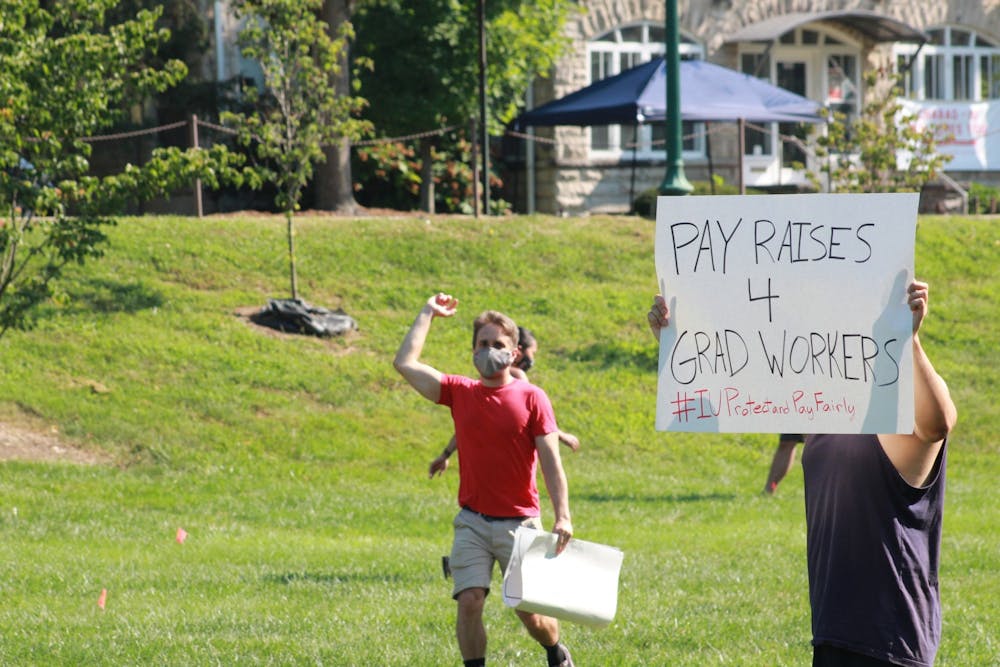In an email sent to IU-Bloomington faculty Tuesday afternoon, IU Provost Rahul Shrivastav outlined potential consequences for graduate workers who decide to strike for union representation.
The Indiana Graduate Workers Coalition-United Electrical Workers, which seeks to represent Student Academic Appointees as a labor union, will vote Sunday on whether to strike if the administration continues to refuse to grant them a path toward union recognition.
The IGWC-UE’s website lists a number of goals including an end to mandatory student fees for graduate students and a living wage with annual raises. The coalition has been advocating for graduate workers since 2019, and pursuing collective bargaining rights to achieve their goals since last year.
According to IGWC-UE spokesperson Cole Nelson, more than 850 graduate workers have already pledged to join a strike if it passes Sunday’s authorization vote. The strike could start as soon as April 13.
“Our options are essentially union or strike,” Nelson said.
Nelson said graduate workers do not want to have to strike, but that the administration has left them little choice by refusing to grant them a pathway to unionization.
“As I have said repeatedly, I do not believe that we need a union to improve graduate education and I will not re-visit this decision,” Shrivastav wrote in the email, citing decisions by his predecessors John Applegate and Lauren Robel.
The provost’s email also suggests a strike could disproportionately impact low-income undergraduate students who depend on Pell grants, a form of need-based financial aid. The email stated their eligibility could be affected in the event that graduate workers withhold final grades as part of the strike. There were no other details provided in the email about this argument.
Related: [IU graduate workers continue fighting for unionization despite tough legal environment]
The argument, said Benjamin Robinson, the chair of the Germanic studies department and president of IU-Bloomington’s chapter of the American Association of University Professors, is disingenuous and chosen for its divisive nature.
While he acknowledged that the administration of Pell grants involves minutiae that could be complicated by a delay in grades, Robinson said it’s the responsibility of the administration to protect students receiving the grants, and well within their powers to do so.
“They can solve that problem, and it’s on them if they don’t,” Robinson said, referring to campus administration.
While Sunday’s vote will determine whether the IGWC-UE authorizes a strike for the latter half of next week, Nelson said the coalition would hold votes at least weekly on whether to continue to strike or not. It’s too soon to say whether a strike would affect the release of final grades.
Graduate workers perform duties such as teaching, grading, research and administrative tasks, in exchange for annual stipends, tuition remission and other benefits. A strike would involve ceasing to perform these duties until IGWC-UE votes to return to work.
“Participation in a work stoppage,” the email from Shrivastav reads in bold font, “will result in non-reappointment to future Student Academic Appointments.”
It also stated graduate workers who choose to strike may face suspension or termination of their appointments.
These consequences rely on an interpretation of the handbook for Student Academic Appointees that classifies a strike as a failure on the part of a graduate worker to satisfactorily perform their duties.
The email stated the consequences would not affect student status, and therefore, would not jeopardize the visas of international students as long as they would be able to maintain full-time enrollment.
IU spokesperson Chuck Carney said any potential consequences would have to be addressed on a case-by-case basis. The responsibility of determining the degree to which individual graduate students participate in a strike would fall to their respective schools and departments.
“Chairs are just flabbergasted by having this dropped on them as an administrative nightmare,” said Robinson.
But when this list of possible consequences was raised during a March 25 chairs and directors meeting, Robinson said, many faculty members present expressed they would not be willing to report which students strike to enforce such consequences.
Related: [As graduate workers contemplate strike, Bloomington campus officials announce raises]
As of Wednesday, more than 400 faculty members have pledged neutrality in their treatment of graduate workers who choose to strike.
Shrivastav addressed the neutrality pledge in his email.
“You may have been asked to remain neutral or to not penalize individuals who stop performing their agreed upon duties,” Shrivastav said. “Although we may sympathize with the spirit of these actions, or, we may agree that there are remaining underlying substantive issues that need to be addressed, we cannot stay neutral in this moment.”
IGWC-UE union representative Sam Smucker described the provost’s comments as unenforceable, hollow threats, and said graduate workers don’t seem to be rattled. The coalition has been preparing graduate workers for such rhetoric from the university, Smucker said.
“This is an extreme response from an administration that is exceptionally disconnected from its campus,” he said. “It's all an attempt to create fear among the lowest paid and some of the most vulnerable people on the campus – especially when you think of international students – who are exercising their rights.”



